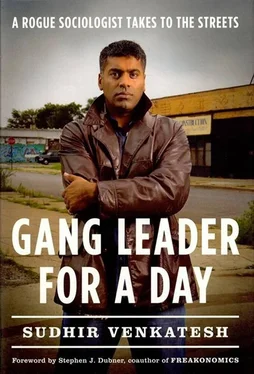By this point in my research, I still felt guilty sometimes for being as much of a hustler, in my own way, as the other hustlers in the neighborhood. C-Note had called me on it, and C-Note was right. I constantly hustled people for information-stories, data, interviews,facts-anything that might make my research more interesting.
So I was happy whenever I had the chance to give a little bit back. The writing workshop hadn’t worked out as well as I’d wanted, and I was searching for another way to act charitably. An opportunity fell into my lap when the Chicago public-school teachers went on strike. Since BK rules stipulated that each member graduate from high school, J.T. asked Autry to set up a program during the strike so that J.T.’s members could stay off the streets and do some home-work. Autry had set up a similar program at the Boys & Girls Club, but gang boundaries forbade J.T.’s members to go there.
Autry agreed, and he asked me to run a classroom in J.T.’s building. I obliged, pretty sure that lecturing high-schoolers on history, politics, and math shouldn’t be too hard.
We met in a dingy, darkened apartment with a bathroom that didn’t work. On a given day, there were anywhere from twenty to fifty teenage gang members on my watch. The air was so foul that I let them smoke to cover the odor. There weren’t enough seats, so the kids forcibly claimed some chairs from neighboring apartments, with no promise of returning them.
On the first day, as the students talked loudly through my lecture on history and politics, J.T. walked in unannounced and shouted at them to pay attention. He ordered Price to take one particularly noisy foot soldier into the hallway and beat him.
Later I asked J.T. not to interrupt again. The kids would never learn anything, I insisted, if they knew that he was going to be monitoring them. J.T. and Autry both thought I was crazy. They didn’t think I had any chance of controlling the unruly teens without the threat of an occasional visit by J.T.
They were right. Within a day the “classroom” had descended into anarchy. In one corner a few guys were admiring a gun that one of them had just bought. (He was thoughtful enough to remove the bullets during class.) In another corner several teenagers had organized a dice game. The winner would get not only the cash but also the right to rob the homeless people sleeping in a nearby vacant apartment. One kid brought in a radio and improvised a rap song about their “Injun teacher,” replete with references to Custer, Geronimo, and “the smelly Ay-Rab.” (It never seemed to occur to anyone that “Arab” and “Indian” were not in fact interchangeable; in my case they were equally valuable put-downs.) The most harmless kids in the room were the ones who patiently waited for their friends to return from the store with some beer.
Things got worse from there. Some of my students started selling marijuana in the classroom; others would casually leave the building to find a prostitute. When I conveyed all this to J.T., he said that as long as the guys showed up, they weren’t hanging out on the street and getting into any real trouble.
Given that they were using my “classroom” to deal drugs, gamble, and play with guns, I wondered exactly what J.T. meant by “real” trouble.
My role was quickly downgraded from teacher to baby-sitter. The sessions lasted about two weeks, until news came that the teachers’ strike was being settled. By this time my admiration for Autry’s skill with the neighborhood kids had increased exponentially.
Despite my utter failure as a teacher, Autry called me again for help. The stakes were a little higher this time-and, for me, so was the reward.
Autry and the other staffers at the Boys & Girls Club wanted me to help write a grant proposal for the U.S. Department of Justice, which had advertised special funds being allocated for youth programs. The proposal needed to include in-depth crime statistics for the projects and the surrounding neighborhood, data that was typically hard to get, since the police didn’t like to make such information public. But if I took on the project, I’d get direct access to Officer Reggie Marcus-“Officer Reggie” to tenants-the local cop who had grown up in Robert Taylor himself and was devoted to making life there better. I jumped at the chance.
I had met Reggie on several occasions, but now I had an opportunity to work closely with him and cultivate a genuine friendship. He was about six feet tall, as muscular and fit as a football player; he always dressed well and carried himself with a quiet determination. I knew that Reggie often dealt directly with gang leaders in the hopes of keeping violence to a minimum and that he was a diplomatic force among the project’s street hustlers. Now I would be able to ask as many questions as I wanted about the particulars of his work.
Why, for instance, did he try to reduce gun violence by making sure that the gangs were the only ones who had guns?
“They don’t like gun violence any more than the tenants, because it scares away customers,” he explained. “So they try to keep things quiet.”
One wintry afternoon I met Reggie at the police station in the Grand Boulevard neighborhood, a few blocks from J.T.’s territory. When I arrived, he told me he still had some phone calls to make, so I went to find a water fountain. The police station was drab, row after row of bland gray cubicles; the air was cold and damp, the tile floor slippery from the tracked-in snow.
Near the water fountain, I came upon a wall covered with Polaroid pictures. They were all of black men in their teens and twenties, most of them looking dazed or defiant. Beneath each photo was a caption with the person’s name and gang affiliation.
Taped next to the photos was a party flyer headlined “MC Southside Fest.” J.T.’s gang hung similar flyers all around the buildings when they were sponsoring a party or a basketball tournament. On the MC flyer, there were several names handwritten along the right margin, as if it were a sign-up sheet: “Watson,” “O’Neill,” “Brown.”
Reggie came by as I was inspecting the flyer.
“Let’s not hang out here,” he said, looking concerned. “And let’s not talk about that. I’ll explain later.”
We were heading over to the Boys & Girls Club to talk to Autry about the Department of Justice grant. As we walked to Reggie’s SUV, parked behind the police station, I was still thinking about the MC flyer.
I recalled a party the Black Kings had thrown a few years back, having rented out the second floor of an Elks Lodge. The women were dressed up, and the men wore spiffy tracksuits or pressed jeans. They drank beer and wine coolers, danced, and passed marijuana joints around the room.
As J.T. and I stood talking in a corner, a group of five men suddenly busted into the room, all dressed in black. One of them held up a gun for everyone to see. The other four ran to the corners of the room, one of them shouting for everyone to get up against the wall. Four of the men were black, one white. J.T. whispered to me, “Cops.” He and I took our places against the wall.
One of the partying gangsters, a huge man, at least six foot two and 250 pounds, started to resist. “Fuck you, nigger!” he shouted. Two of the men in black promptly yanked him into the bathroom- where, from the sound of it, they beat him brutally. We all stood silently against the wall, listening to his grunts and groans.
“Who’s next?” shouted one of the men in black. “Who wants some of this?”
Two of them pulled out black trash bags. “Cash and jewels, I want everything in the bag!” one shouted. “Now!”
When the bag reached us, J.T. calmly deposited his necklace and his money clip, fat with twenties. I put the cash from my pocket, about fifteen dollars, into the bag. As I did so, the man holding the bag looked up and stared at me. He didn’t say anything, but he kept glancing over at me as he continued his collection rounds. He seemed puzzled as to what I, plainly an outsider, was doing there.
Читать дальше












